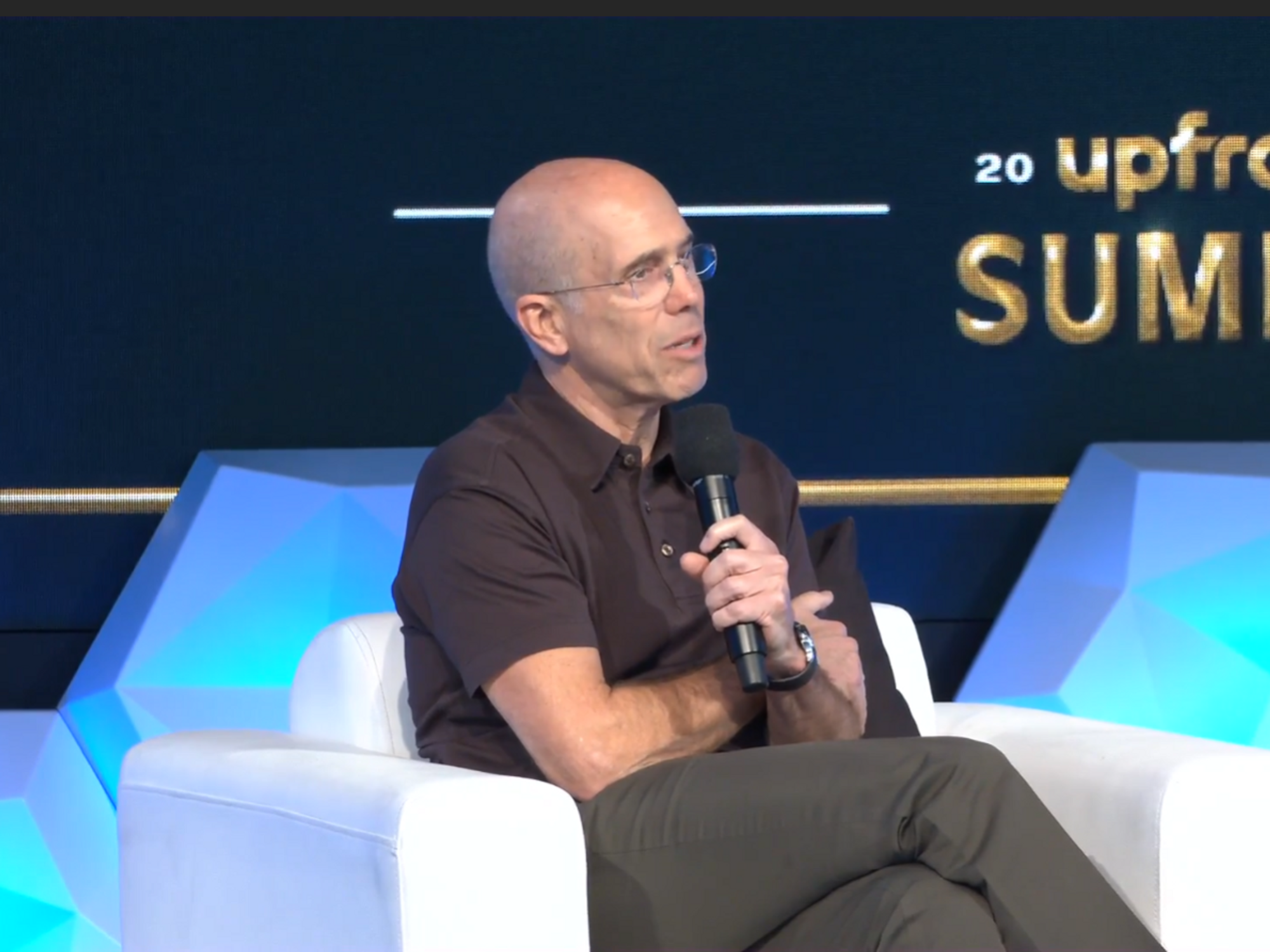Jeffrey Katzenberg Defends Quibi Failings, Talks NFT Investments
Samson Amore is a reporter for dot.LA. He holds a degree in journalism from Emerson College. Send tips or pitches to samsonamore@dot.la and find him on Twitter @Samsonamore.

Sign up for dot.LA's daily newsletter for the latest news on Southern California's tech, startup and venture capital scene.
Jeffrey Katzenberg didn’t mince words when addressing the elephant in the room during his appearance at the Upfront Summit on Wednesday—saying he learned valuable lessons from the rapid demise of his short-form TV app Quibi.
“I'm humbled by [Quibi’s] failure; I’m glad we got out when we did and we were able to return money to investors,” Katzenberg said onstage at the venture capital conference in Downtown Los Angeles. He argued that while Quibi’s content was solid, the startup “didn’t have product-market fit”—alluding to its April 2020 launch amid the early days of the coronavirus pandemic.
The app’s thesis was to give Hollywood stars like Liam Hemsworth, Idris Elba and Queen Latifah a platform to produce content segmented into 10-minute episodes and made specifically to be viewed on mobile phones. But the pandemic, which kept people confined to their homes, destroyed Quibi’s market for on-the-go content to be consumed during viewers’ commutes. Some six months after launching with $1.75 billion in funding to its name, Quibi folded; Katzenberg returned roughly $600 million to investors and sold the app’s library to Roku.
“The content that was made, I have to say, actually delivered on the promise of that in an incredible way, and it’s worked brilliantly for Roku,” Katzenberg said. “We didn't have product-market fit… I’m not looking for an excuse. I got my shot, people backed us, gave us an incredible amount of enthusiasm, support, access, money—everything we wanted and needed to get a shot at this, and it didn’t work. And we moved very quickly to shut it down when it didn't work.”
With Quibi in the rearview, Katzenberg has turned his focus to WndrCo, his Beverly Hills-based venture capital firm that is mostly investing in non-media ventures. The former Disney chariman and DreamWorks co-founder noted that he’s particularly optimistic on NFTs; WndrCo has invested in at least six NFT-related companies since last year, according to PitchBook data, including crypto exchange Gemini, sports NFT exchange SportsIcon and OnChain Studios, which sells digital collectible toys as NFTs.
Katzenberg also shouted out WndrCo’s investments in OpenSea, one of the most popular NFT marketplaces, and Dapper Labs, the company behind NFT platform NBA Top Shot as well as Dapper Collective, the virtual influencer startup formerly known as Brud. WndrCo founding partner Sujay Jaswa, who joined Katzenberg onstage, said the VC firm’s investment approach is centered around the founders it chooses to back.
“Ninety-nine percent of the time, almost nothing we’ve invested in at the beginning is what it became—but the person [leading the venture] is who drove the outcome,” Jaswa said. “That’s really what we bet on with almost all of these earlier stage things, and that’s what worked for us in NFT's.”
- Learning from Quibi's Quick Collapse - dot.LA ›
- Why Did Quibi Fail? - dot.LA ›
- LL Cool J, Paris Hilton and Laura Dern at Upfront Summit ›
- NFT Brands has Unveiled a $3.6 Million Seed Funding Round - dot.LA ›
- Jeffrey Katzenberg’s WndrCo Raising New Venture Fund - dot.LA ›
Samson Amore is a reporter for dot.LA. He holds a degree in journalism from Emerson College. Send tips or pitches to samsonamore@dot.la and find him on Twitter @Samsonamore.




 Image Source: Tinder
Image Source: Tinder Image Source: Apple
Image Source: Apple